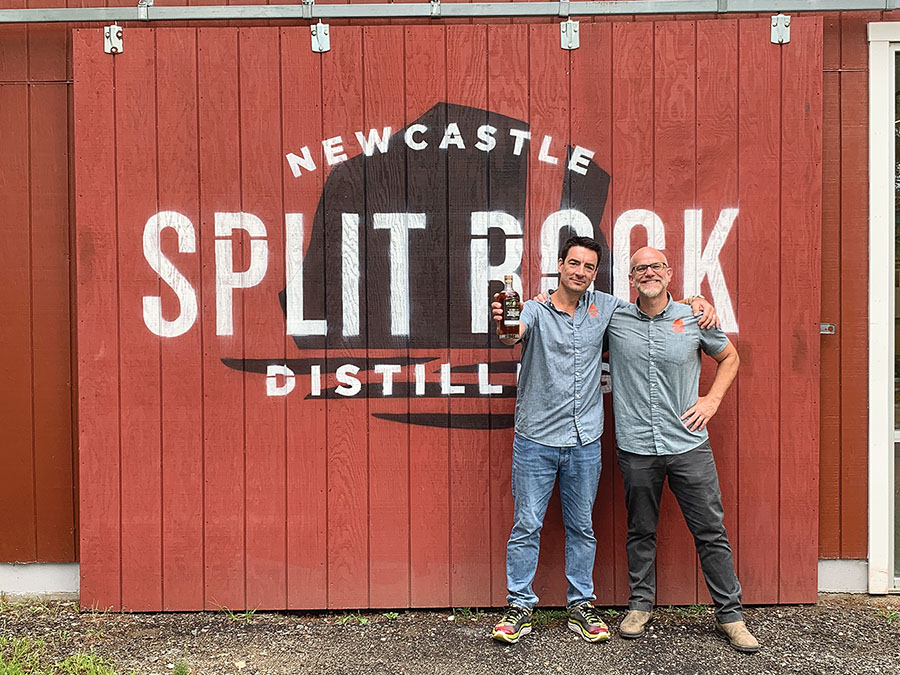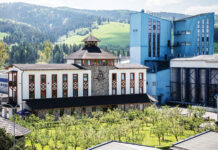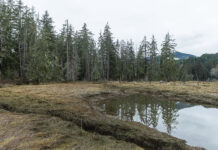Conveniently located along the well-traveled coastal Route 1, Split Rock Distilling was co-founded by Topher Mallory and Matt Page. They regale me with how Newcastle, Maine, has grown in the 25 and 20 years they’ve respectively called it home. “We came here to make the best we could through the local, organic agriculture culled from our neighbors, to make all of our products from scratch as [much as] possible. It’s been a fun challenge setting out on uncharted territory,” says Mallory. “It’s good that we were young and crazy enough to see it through!” Page chimes in.
After working in Kentucky as a site evaluator, Page arrived in Maine to work for an established artist and to live in a place where he knew his neighbors. Mallory had previously worked in finance in Oregon before leaving to shape surfboards. He’d traveled with his wife between the two Portlands until deciding to reside in the eastern one.
Their friendship began when they were the only two men at a woman’s birthday party in 2005. They met hunkering next to a fridge, where they shared their loves of climbing and travel over drinks. While drinking bourbon with friends in 2012, they commiserated about the lack of Maine-made bourbons. Today, bourbon is the core of the Split Rock portfolio — although it has grown beyond just whiskey.
“It’d have been easier to have bought filled barrels to age and bottle here, but we were setting out to make bourbons that we could look at every step of the process knowing that we were there creating it,” says Mallory. “That it’s organic is part of the challenge: the methodology of production and sourcing the grains, filling out the requisite FDA forms, getting the best ingredients to make the best product with them,” adds Page. The dedication to locally sourced ingredients extends beyond the company’s spirits — which include a Maine requisite of a blueberry product, here one of its three vodkas — to its range of five bitters and 14 Royal Rose brand syrups.

“We knew to settle on a place along Route 1 because of the need for a definitively accessible location. We did all our government and business applications, construction learning, and applying together. For two years it felt as though we were perpetually filling out forms and asking permissions from people in many offices. It was a lot more than painting or putting up drywall [like] we expected,” says Mallory, shaking his head.
All of Split Rock’s water needs are supplied by an on-site well fixed into a recirculation system, which provides water for the products themselves as well as fermentation, mashing, cooling, and distilling (a glycol system was deemed too expensive and energy-inefficient). Friends and family joined in the bootstrapped, hands-on renovation and revitalization of the property.
Since its July 16, 2016 launch, Split Rock has used recycled bottles with post-consumer waste paper labels. Since April 2018, it’s offset some of its electrical usage with 36 solar panels producing over 11,000 kw hours annually. Surplus energy is contributed back to the grid, supporting midcoast Maine’s power grid. Its nearly 10,000 lbs. of carbon offset is buttressed with an on-site electric vehicle charger.
Following a diligent search for consistent sources of organic Maine grain (no co-packer or NGS ever), Page and Mallory are now seven years into a relationship with New York’s Champlain Valley Milling, using its food-grade cornmeal for vodkas and gins; whole wheat, barley, and rye bread flours for bourbons; and molasses and granulated cane sugar for its rums.
After heating the water, meals or flours enter to fix its mash within jacketed tanks that are held at 180°F, then slowly lowered to 92°F over seven hours. After an enzymatic starch conversion, Ferm Solutions yeast, chosen for its ester profiles, is then pitched and maintained at 90–97°F. After a five-day fermentation, half of the tun enters the pot still for the first strip run. The spent grain goes into a tank or IBC so a nearby farmer can pick it up to transfer off-site to his critters. The second half of the tun enters the still to repeat the process. The next day, the entirety of the low wines reenters the still with the four-plate whiskey or 16-plate vodka column engaged for a spirit run to separate the hearts for transfer into a barrel or tank, with the tails set aside for another run.
“The nice part of being organic is that our spent grains can get trucked down the road (along with the Royal Rose refuse) to the nearby organic Straws Farm to be fed to livestock and used for composting,” beams Mallory, noting that 100% of Split Rock’s waste stream is repurposed.
Split Rock bourbons have a mashbill of 60% corn, 20% wheat, 15% barley, and 5% rye. They, like all of Split Rock’s spirits, are proofed with reverse osmosis-filtered well water to 125 proof before entering 30- and 53-gallon #3 char barrels made by Minnesota’s The Barrel Mill cooperage. Kentucky native Page had always preferred the soft, wheated style of bourbon, such as Maker’s Mark, which also found favor with Mallory. Even after interning at Maine Craft Distilling, which made a Scotch-style whiskey, and at New England Distilling, where they worked more with ryes, they always came back to wheated bourbon. The nascent cocktail boom didn’t affect their decision. Knowing they couldn’t serve cocktails at the distillery tasting room (until the law changed in 2017) inspired the duo to make their bourbon sippable. “That was our metric, one which allowed for all our spirits to follow that sippable path,” affirmed Mallory.
Like other distilleries awaiting the maturation of brown spirits — in Split Rock’s case, its bourbons — attention must be paid to white spirits for the maintenance of financial health. After the vodka’s strip run, Page does a mid-wines run, then a final spirit run through a 16-plate vodka column. Naturally, the vodka comprises the base for the brand’s gins, flavored vodkas, and the extraction base for its bitters line.
There’s a through line in the Split Rock portfolio, a vision and clear direction to its spirits exemplified by its bottled-in-bond bourbon, aged in 30-gallon barrels and showing just shy of an excess of woodiness. Its vodka has character, clearly well-made with no discernible flaws after resting 30 days in tank before bottling. The blueberry vodka is infused with wildcrafted low-bush blueberries from Jon Fishman’s (of the band Phish) nearby Elderflower Farms. After 7–14 days, the blueberries are then crushed, the mixture is filtered, and the vodka is proofed before bottling. It’s entirely unadulterated, with a color, aroma, and flavor that reflects its true fruit character. The same process applies to Split Rock’s horseradish vodka, with horseradish from nearby Snakeroot Farm. Processing the first 50-pound batch of the pungent roots called for full-face respirators, but Mallory says, “I remember crying the next day!” They have since begun seeking a food processing facility to do this moving forward. The finished product smells and tastes true to the freshly grated root.
Split Rock’s gins are macerated and distilled with the heavier botanicals in pot stills. Citrus and other lighter botanicals are added later for a vapor infusion during a second distillation. All gins are released at 45% ABV. Clear gins are rested 30 days before release, while barreled versions mature an additional six to 12 months in used bourbon barrels. This shows little oak aroma, though the vanillins buffer its smell and taste, making for a memorable sip recognized in Carlo DeVito’s Drink The Northeast as the best barrel-aged U.S. gin he’d tasted.
The brand’s bitters and Royal Rose syrups are also produced on-site. In 2018, Split Rock purchased the Royal Rose brand, which they’d previously used in the cocktails they began selling at the tasting room when a new on-premise service law went into effect in 2017. The transaction more than doubled the facility size, with one of Royal Rose’s original staff members shepherding the change and continuing on under Split Rock’s ownership.
“One of the more exciting sales points for us is to have something to sell to people who may not drink alcohol whether on the wagon, pregnant, or under 21,” explains Mallory. Its rose petal and lavender/lemon bottlings are the most popular and are distributed through Whole Foods Market. Mallory recommends the blackberry and cardamom/clove syrups in old fashioneds.
As with the spirits, local ingredients are the star. The saffron syrup uses saffron sourced from two Maine farms, a step which first brought Split Rock in contact with the Maine Organic Farmers and Gardeners Association. Its foray into bitters “was an extension into our cocktail-supportive line of syrups,” says Mallory, an effort to “build the same complexities and quality requirements into these as we did for the syrups.” All products have since acquired EarthKosher certification.
In addition to self-distributing in Maine, Split Rock has wholesale distribution in California, New Jersey, and New York.








